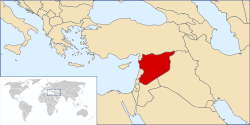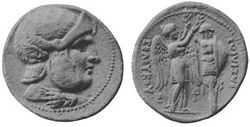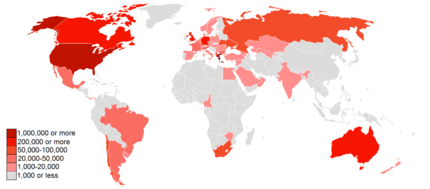Greeks in Syria

The Greek presence in Syria began in the 7th century BC and became more prominent during the Hellenistic period and when the Seleucid Empire was centered there. Today there is a Greek community of about 4,500 in Syria, most of whom have Syrian nationality and who live mainly in Aleppo, the country's main trading and financial center, and Damascus, the capital.[1]
History

Greek presence is attested from early on and in fact the name of Syria itself is of Greek provenance from the Greek word for the Assyrians.[2] However it was during the Hellenist times that it was most prominent. In particular, the Seleucid Empire, which was centered in modern day Syria and Lebanon and reached as far as Pakistan at the height of its power, was a major centre of Hellenistic culture which maintained the preeminence of Greek customs and where a Greek elite dominated, mostly in the urban areas.[3] Following the decline of the Seleucid Empire, Greek culture began to wane, particularly following the Muslim conquest.
Present situation
Damascus has been home to an organized Greek community since 1913, although there are also significant numbers of Greek Muslims originally from Ottoman Crete who have been living in several coastal towns and villages of Syria and Lebanon since the late Ottoman era. They were resettled there by Sultan Hamid II following the 1897-8 Greek-Turkish war, in which the Ottoman empire lost the island of Crete to the Kingdom of Greece. The most notable but still understudied Cretan Muslim village in Syria is al-Hamidiyah, many of whose inhabitants continue to speak Greek as their first language. There of course is also a significant Greco-Syrian population in Aleppo, as well as smaller communities in Latakia, Tartus and Homs.[1] As with most other ethnic minorities in Syria, most Greco-Syrian Orthodox Christians speak Arabic only, along with a school-taught foreign language such as French or English; however, a working or rudimentary knowledge of Greek for liturgical purposes as well as among older, particularly first and second-generation, individuals, is relatively widespread. Damascus has a private Greek-language school as well for the community that is maintained by guest instructors from Greece.
Greek Muslims in Syria
In addition to the Greek Orthodox Christian population there are also about 8,000 Greek-speaking Muslims of Cretan origin in Al-Hamidiyah, Syria and 7,000 people of Greek Muslim descent in Tripoli, Lebanon.[4] Greek Muslims constitute a majority of Al-Hamidiyah's population.[4] By 1988, many Greek Muslims from both Lebanon and Syria had reported being subject to discrimination by the Greek embassy because of their religious affiliation. The community members would be regarded with indifference and even hostility, and would be denied visas and opportunities to improve their Greek through trips to Greece.[4]
See also
- Greece–Syria relations
- Antiochian Greek Orthodox Christians
- Greeks in Lebanon
- Greeks in Saudi Arabia
- Greeks in Turkey
References
- ↑ 1.0 1.1 Greek Ministry of Foreign Affairs Relations with Syria
- ↑ Herodotus. "Herodotus VII.63".
VII.63: The Assyrians went to war with helmets upon their heads made of brass, and plaited in a strange fashion which is not easy to describe. They carried shields, lances, and daggers very like the Egyptian; but in addition they had wooden clubs knotted with iron, and linen corselets. This people, whom the Hellenes call Syrians, are called Assyrians by the barbarians. The Chaldeans served in their ranks, and they had for commander Otaspes, the son of Artachaeus.
- ↑ Britannica, Seleucid kingdom, 2008, O.Ed.
- ↑ 4.0 4.1 4.2 Greek-Speaking Enclaves of Lebanon and Syria by Roula Tsokalidou. Proceedings II Simposio Internacional Bilingüismo. Retrieved 18-12-08
| ||||||||||||||||||||||||||||||||
